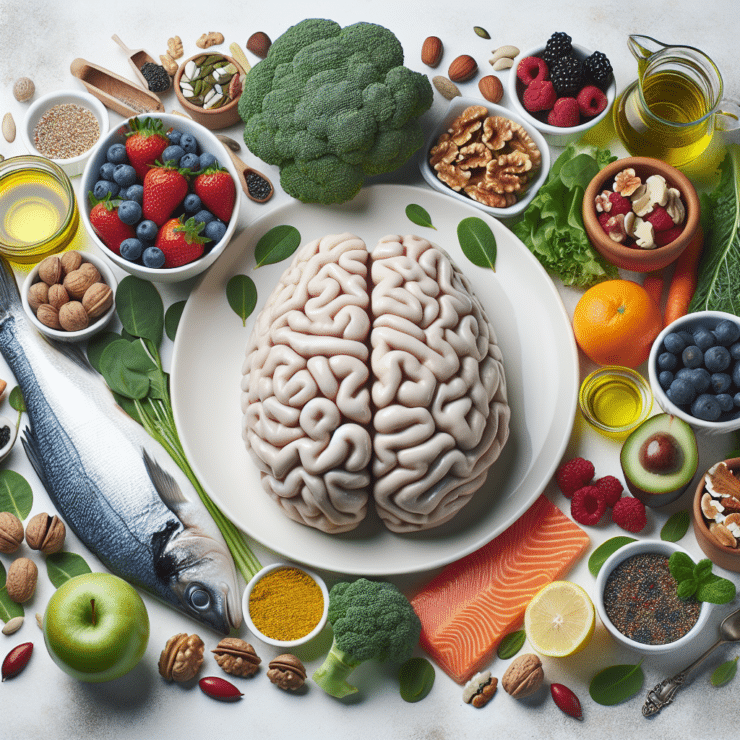The Brain-Food Connection
The intricate relationship between the foods consumed and brain function is a subject of increasing interest within the realms of nutrition and cognitive sciences. This connection underscores the impact that dietary choices have on mental performance and overall brain health.
Understanding How Nutrition Affects the Brain
Nutrients from food play a critical role in the development and function of the brain. They contribute to the structure of brain cells, the formation of neurotransmitters, and the maintenance of brain plasticity. The table below highlights key nutrients and their primary roles in brain health:
| Nutrient | Role in Brain Health |
|---|---|
| Glucose | Primary energy source for the brain |
| Amino Acids | Precursors to neurotransmitters |
| Fatty Acids | Components of cell membranes |
| Vitamins | Co-factors in metabolic processes |
| Minerals | Involved in nerve signal transmission and brain function |
An imbalance or deficiency in these essential nutrients can lead to alterations in brain structure and function, which may manifest as changes in cognition, mood, and overall mental well-being.
The Significance of a Healthy Diet for Cognitive Function
A well-rounded diet rich in essential nutrients is paramount for maintaining cognitive function and preventing neurological decline. Consuming a variety of nutrient-dense foods supports brain health by enhancing memory, attention, and problem-solving abilities. It also plays a preventive role against neurodegenerative diseases.
Research has identified specific dietary patterns that are associated with improved cognitive outcomes. These diets are characterized by their richness in fruits, vegetables, whole grains, lean proteins, and healthy fats, all of which provide an abundance of the nutrients necessary for optimal brain performance. The Mediterranean diet and the MIND diet are two examples that have been linked with lower risks of cognitive decline.
In summary, the brain-food connection is a pivotal aspect of cognitive health, influencing both the brain’s structural integrity and functional capacity. Embracing a diet for brain health, replete with diverse, nutrient-rich foods, can foster mental acuity and safeguard against cognitive deterioration.
Key Nutrients for Brain Health
A diet for brain health is incomplete without discussing the essential nutrients that support cognitive function. These nutrients play various roles, from maintaining brain structure to protecting against cognitive decline. Here, we explore omega-3 fatty acids, antioxidants, and B-vitamins, which are paramount for a brain-boosting diet.
Omega-3 Fatty Acids and Brain Structure
Omega-3 fatty acids are fundamental components of the brain’s structure. They are crucial for the fluidity and function of cell membranes and play a significant role in neurogenesis, the creation of new neurons.
| Nutrient | Role in Brain Health | Recommended Sources |
|---|---|---|
| Omega-3 Fatty Acids (EPA & DHA) | Essential for brain cell membrane integrity and signal transmission. | Fatty fish (salmon, mackerel), flaxseeds, chia seeds, walnuts |
Adequate intake of omega-3 fatty acids, particularly EPA and DHA, is associated with reduced risks of cognitive decline and neurodegenerative diseases. For individuals who do not consume fish, plant-based alternatives such as flaxseeds and chia seeds are also beneficial.
Antioxidants and Cognitive Protection
Antioxidants play a defensive role in brain health by neutralizing harmful free radicals that can damage brain cells. This oxidative stress is implicated in age-related cognitive decline and brain diseases.
| Antioxidant | Role in Brain Health | Recommended Sources |
|---|---|---|
| Vitamin C & E, Flavonoids | Protect brain cells from oxidative damage. | Citrus fruits, berries, nuts, seeds, leafy greens |
Incorporating a variety of antioxidant-rich foods can enhance cognitive protection and support overall brain function.
B-Vitamins and Energy Metabolism
B-vitamins are vital for energy metabolism in the brain. They aid in the production of energy from the foods we consume, and they are also involved in the synthesis of neurotransmitters.
| B-Vitamin | Role in Brain Health | Recommended Sources |
|---|---|---|
| B6, B12, Folate | Support neurotransmitter synthesis and energy metabolism. | Whole grains, eggs, dairy, leafy greens, legumes, meat |
Ensuring sufficient intake of B-vitamins, especially B6, B12, and folate, is associated with better brain function and lower levels of homocysteine, an amino acid linked to cognitive decline.
By focusing on these key nutrients within a diet for brain health, individuals can support their cognitive functions and protect against the decline in brain health. It’s important to note that these nutrients work synergistically, and a well-rounded diet is more beneficial than focusing on single nutrients.
Dietary Patterns for Optimal Brain Function
The food individuals consume plays a significant role in the health and performance of the brain. Certain dietary patterns are associated with improved cognitive function and may reduce the risk of neurodegenerative diseases.
The Mediterranean Diet and Brain Performance
The Mediterranean diet, rich in fruits, vegetables, whole grains, olive oil, and fish, has been linked to numerous health benefits, including enhanced brain performance. This diet emphasizes the consumption of foods high in omega-3 fatty acids, antioxidants, and fiber, which are crucial for maintaining brain health.
Research has shown that adherence to the Mediterranean diet correlates with slower cognitive decline and a lower risk of developing Alzheimer’s disease. The high intake of polyunsaturated fats, particularly from fish and olive oil, supports brain structure and function, while the diverse array of plant-based foods provides the necessary antioxidants to protect the brain from oxidative stress.
| Components of the Mediterranean Diet | Cognitive Benefits |
|---|---|
| Omega-3 Fatty Acids | Supports brain structure and function |
| Antioxidants | Protects against oxidative stress |
| Fiber | Promotes gut health, which is linked to cognitive health |
The MIND Diet and Its Implications for Brain Health
The MIND diet (Mediterranean-DASH Intervention for Neurodegenerative Delay) is a hybrid of the Mediterranean and DASH (Dietary Approaches to Stop Hypertension) diets, both of which are known for their positive impact on heart health. The MIND diet specifically targets brain health and aims to prevent dementia through dietary choices.
Key components of the MIND diet include leafy greens, berries, nuts, whole grains, fish, poultry, beans, and olive oil, with limited intake of red meat, butter, cheese, sweets, and fried or fast food. This diet encourages the consumption of foods rich in nutrients such as omega-3 fatty acids, flavonoids, and vitamins E and B, which are essential for maintaining neuronal function and reducing inflammation.
Studies suggest that the MIND diet may significantly lower the risk of developing Alzheimer’s disease, even when moderately adhered to. The combination of heart-healthy and brain-healthy foods makes it a compelling dietary approach for those looking to enhance their cognitive abilities and protect their brain as they age.
| Key Components of the MIND Diet | Brain Health Benefits |
|---|---|
| Leafy Greens | High in vitamins and fiber |
| Berries | Rich in flavonoids for memory retention |
| Nuts and Seeds | Provide omega-3s and antioxidants |
| Whole Grains | Contribute to overall vascular health |
| Fish & Poultry | Lean proteins with omega-3s |
Adopting a diet for brain health, such as the Mediterranean or MIND diet, can be an effective strategy for enhancing mental performance and protecting against cognitive decline. These dietary patterns provide a roadmap for individuals who are committed to nurturing their brain through nutrition.
Foods that Boost Brain Power
The quest for maintaining and enhancing cognitive abilities often leads individuals to explore various diet for brain health. Certain foods, packed with essential nutrients, can provide considerable cognitive benefits.
Leafy Greens and Their Cognitive Benefits
Leafy greens, the verdant staples of a nutritious diet, are rich in vitamins, minerals, and fiber. They are particularly known for their high levels of vitamin K, folate, and lutein, which studies suggest may contribute to preserving cognitive function.
| Leafy Green | Nutrients Important for Brain Health |
|---|---|
| Kale | Vitamin K, Lutein, Folate |
| Spinach | Vitamin E, Magnesium, Folate |
| Swiss Chard | Vitamin K, Magnesium, Potassium |
Consuming a diet that includes a variety of leafy greens can be associated with a slower rate of cognitive decline when compared to individuals with lower intake levels. The recommended serving is at least one cup of raw or half a cup of cooked leafy greens daily.
Berries and Their Role in Memory Enhancement
Berries are not only delicious but also potentially beneficial for the brain. These fruits contain flavonoids, specifically anthocyanins, which have antioxidant and anti-inflammatory effects. Studies indicate that these compounds may improve memory function.
| Berry Type | Flavonoids and Antioxidants |
|---|---|
| Blueberries | Anthocyanins, Vitamin C |
| Strawberries | Flavonoids, Vitamin C |
| Blackberries | Anthocyanins, Vitamin K |
Incorporating a variety of berries into one’s diet may contribute to cognitive health and could be linked to a reduction in age-related memory decline. A serving of berries can be about half a cup to one cup, several times a week.
Nuts and Seeds as Brain-Enhancing Snacks
Nuts and seeds are compact powerhouses of omega-3 fatty acids and antioxidants, along with being excellent sources of protein and healthy fats. These nutrients are essential for brain health, promoting neuroprotection and supporting cognitive function.
| Nut/Seed Type | Brain-Boosting Nutrients |
|---|---|
| Walnuts | Alpha-linolenic acid (ALA) |
| Almonds | Vitamin E |
| Sunflower Seeds | Vitamin E, Magnesium |
Adding a small handful of nuts or seeds to one’s daily diet can be beneficial for brain health. They make for convenient snacks that not only satiate hunger but also contribute to the nourishment of the brain.
By integrating these brain-boosting foods into one’s dietary patterns, individuals can take proactive steps toward enhancing their mental performance and overall well-being. It’s important to consider these foods as part of a balanced and varied diet for brain health.
Implementing a Brain-Healthy Diet
A diet for brain health focuses on incorporating foods that support cognitive function and mental clarity. The implementation of such a diet requires planning and a conscious effort to include brain-boosting foods in daily meals.
Planning Brain-Boosting Meals
Planning meals that enhance brain function involves selecting ingredients rich in nutrients that support brain health. These ingredients include omega-3 fatty acids, antioxidants, and B-vitamins, known for their positive impact on the brain’s structure and cognitive abilities. Meal planning should aim to incorporate a variety of these nutrients throughout the day.
| Meal Time | Brain-Boosting Foods | Key Nutrients |
|---|---|---|
| Breakfast | Oatmeal with berries and walnuts | Omega-3 fatty acids, antioxidants, B-vitamins |
| Lunch | Grilled salmon with quinoa and mixed greens | Omega-3 fatty acids, fiber, vitamins |
| Dinner | Chicken with whole-grain pasta and steamed vegetables | Lean protein, complex carbohydrates, minerals |
Snacks can also be an opportunity to feed the brain; options like a small handful of almonds or a piece of fruit are excellent choices.
Incorporating Brain Foods into Your Daily Routine
Incorporating brain foods into one’s daily routine requires identifying opportunities within the day to include nutrient-dense options. This could mean adding a variety of nuts and seeds to salads, using olive oil as a dressing, or choosing whole grains over refined grains. It’s about making strategic choices that can enhance the overall quality of the diet.
| Daily Habit | Brain Foods | Benefits |
|---|---|---|
| Mid-Morning Snack | Greek yogurt with honey and almonds | Protein, healthy fats, antioxidants |
| Afternoon Break | Carrot sticks with hummus | Fiber, vitamins, healthy fats |
Balancing Macronutrients for Mental Clarity
Balancing macronutrients is essential for maintaining energy levels and mental clarity. A diet for brain health should include an appropriate balance of carbohydrates, proteins, and fats to ensure that the brain has a steady supply of energy throughout the day.
| Macronutrient | Percentage of Daily Intake | Brain-Healthy Sources |
|---|---|---|
| Carbohydrates | 45-65% | Whole grains, fruits, vegetables |
| Proteins | 10-35% | Fish, chicken, legumes, nuts |
| Fats | 20-35% | Avocados, olive oil, fatty fish |
Ensuring that each meal has a combination of these macronutrients can help in maintaining cognitive performance and supporting overall brain health. It’s crucial to choose foods that not only provide energy but also contribute to the structural integrity and function of the brain.
Potential Pitfalls to Avoid
While certain foods and nutrients are known to enhance cognitive function, others may impair it. It is crucial for those engaged in learning and cognitive development to be aware of these potential dietary pitfalls.
Foods That May Impair Cognitive Function
Certain foods have been linked to reduced cognitive performance. These include but are not limited to:
- Trans Fats: Found in some fried foods, baked goods, and processed snacks, trans fats can lead to inflammation and impaired brain function.
- Saturated Fats: High intake of saturated fats from foods like butter, fatty meats, and full-fat dairy may negatively affect cognitive health.
- Refined Carbohydrates: Foods high in refined sugars and white flour can induce brain fog and diminish concentration levels.
To better understand the impact of these foods, consider the following table:
| Food Type | Potential Cognitive Impact |
|---|---|
| Trans Fats | Increased risk of cognitive decline and lower brain volume |
| Saturated Fats | May impair memory and cognitive flexibility |
| Refined Carbohydrates | Can lead to cognitive impairment and reduced attention span |
Understanding the Impact of Sugar and Processed Foods
Sugar and processed foods can have a significant impact on brain health. High sugar consumption can lead to fluctuations in blood glucose levels, which may affect brain function and lead to a reduction in cognitive abilities over time. The brain uses glucose as its main energy source, but the key is to maintain steady levels, rather than experiencing spikes and crashes.
Processed foods often contain additives, high sodium levels, and artificial ingredients that may negatively influence cognitive health. These foods can also be high in calories yet low in nutrients, contributing to an overall poor diet that can affect brain function.
Here is a brief overview of the impact of excessive sugar and processed food consumption on cognitive function:
| Nutrient | Cognitive Impact |
|---|---|
| Sugar | Can impair memory and reduce neuroplasticity |
| Processed Foods | May lead to cognitive decline and decreased brain function |
By being aware of these potential dietary pitfalls, individuals can make more informed choices to protect and enhance their cognitive function. It is important to focus on a balanced diet rich in brain-boosting foods to support mental clarity and performance.
The Role of Hydration in Brain Health
Achieving peak brain performance goes beyond what one eats; it also hinges on staying adequately hydrated. The human brain is approximately 75% water, and even slight dehydration can have a profound impact on cognitive functions. This section explores the critical interplay between water intake and brain health, as well as the consequences of inadequate hydration.
Water Intake and Cognitive Performance
Hydration is a key factor in maintaining cognitive performance. Water consumption directly influences the brain’s structure and function, and adequate fluid intake is crucial for neurotransmission, the removal of toxins, and providing nutrients to the brain. Studies show that optimal hydration can lead to improved attention, memory, and motor skills.
| Cognitive Function | Impact of Adequate Hydration |
|---|---|
| Attention and Concentration | Enhanced ability to focus and process information |
| Short-term Memory | Improved recall abilities |
| Motor Skills | Greater precision and coordination |
Adults are generally advised to consume about 2.5 to 3.7 liters of water per day for men and 2 to 2.7 liters for women from all beverages and foods, but these needs can vary based on multiple factors, including activity level and environmental conditions. It is key to listen to one’s body and consume water regularly throughout the day to help sustain brain function.
The Effects of Dehydration on the Brain
Even minimal dehydration can have negative effects on the brain. Symptoms of dehydration include difficulty in concentrating, brain fog, headaches, fatigue, and mood fluctuations. Prolonged dehydration can lead to more serious cognitive issues.
The table below highlights the potential cognitive impairments associated with dehydration:
| Level of Dehydration | Potential Cognitive Impairments |
|---|---|
| Mild (1-2% body weight loss) | Reduced concentration, increased reaction times |
| Moderate (2-5% body weight loss) | Impaired memory, heightened anxiety, decreased motor coordination |
| Severe (more than 5% body weight loss) | Confusion, exhaustion, severe cognitive decline |
Preventing dehydration is essential for maintaining cognitive function and overall brain health. Individuals should make a conscious effort to drink water regularly, particularly those engaged in activities that require intense mental exertion. By prioritizing hydration, one can support brain function and enhance their learning and professional development endeavors.
Disclaimer: This content is provided for informational purposes only and does not constitute medical advice, diagnosis, or treatment. While dietary strategies can support cognitive function and mental performance, they should not replace professional healthcare advice. Always consult with a healthcare provider or a nutrition specialist before making significant changes to your diet, especially if you have underlying health conditions or specific dietary needs. Use of this information is at your own risk.











